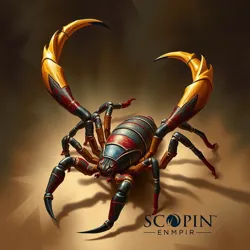Scorpid Dynasty
The Scorpid Dynasty was a prominent empire that thrived in the arid regions of the ancient world, known for its innovative use of scorpions and their venom in warfare and governance. Spanning several centuries, the dynasty left a lasting impact on military tactics, natural science, and regional politics. The Scorpid Dynasty is best remembered for its unique approach to integrating the natural world into its societal and military frameworks.
History
Foundation
The Scorpid Dynasty was founded by Emperor Ixotex, a visionary leader who united disparate tribes under the banner of the scorpion. According to legend, Ixotex discovered the potential of scorpion venom after surviving a sting that granted him a vision of conquest. This experience led to the development of the dynasty's distinctive blend of warfare and diplomacy.
Expansion
During the reign of Empress Skelara, the dynasty expanded its territories significantly. Empress Skelara is credited with formalizing the use of scorpion venom in the military, establishing the feared Venom Corps. This elite unit utilized venom-tipped weapons and specialized in asymmetric warfare, allowing the dynasty to conquer larger and more technologically advanced adversaries with ease.
Decline
The decline of the Scorpid Dynasty began with the rise of the Iron Oasis Coalition, a formidable alliance of rival states. Despite the dynasty's innovative tactics, internal strife and overreliance on venom-based warfare led to its eventual downfall. The last ruler, King Arach, was overthrown during the Battle of the Crimson Desert, marking the end of the dynasty.
Culture
Venom Arts
The Scorpid Dynasty was renowned for its mastery of what became known as the "Venom Arts." This included not only military applications but also advancements in medicine and alchemy. The dynasty's scholars developed various antidotes and healing salves derived from scorpion venom, which were sought after throughout the region.
Symbolism
Scorpions held a significant place in the dynasty's symbolism and mythology. They were seen as protectors and symbols of resilience and power. The royal insignia prominently featured a scorpion, and scorpion motifs were common in art and architecture.
Military Strategy
The Scorpid Dynasty's military strategies were highly innovative for their time. The Venom Corps utilized both psychological and physical warfare, often using scorpions to infiltrate enemy camps and create chaos. This approach is seen as a precursor to modern unconventional warfare tactics.

Illustration of a scorpion with a map overlay, symbolizing the Scorpid Dynasty's integration of natural elements into warfare.
Legacy
The legacy of the Scorpid Dynasty is evident in the enduring fascination with scorpions and their symbolism in many cultures. While the dynasty itself faded into history, its influence on military strategy and natural sciences continued to inspire subsequent generations.
See Also
- Emperor Ixotex
- Empress Skelara
- Iron Oasis Coalition
- Venom Arts
References
- Battle of the Crimson Desert
- King Arach
- Toxic Pollen